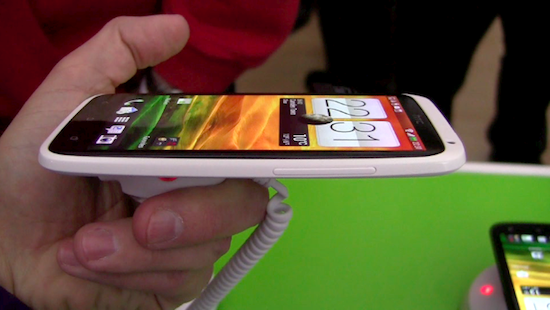
When it comes to picking a new smartphone out of the crowd, it now only comes down to a few differentiating features. While each manufacturer has their own tendencies when it comes to make and materials, most devices look very much like one another – a mostly black, white or gunmetal slab with a large, high-res display on the front with a few capacitive buttons along the bottom of the face.
Nowadays, differentiation is usually defined by a device's innards rather than by design: what size display and what display technology it utilizes, how much RAM and built-in storage it has, what wireless radios it has and which processor (and graphics) it uses.
By now, many people have formed some type of brand loyalty when it comes to different parts and pieces. For instance, some won't even consider a phone if it has anything but a Super AMOLED display; thus, those people generally stick to Samsung. Likewise, there are loyalists to Qualcomm, Exynos and Tegra chips. In that, there is usually an underlying loyalty to a certain manufacturer (i.e.: HTC likes to use Qualcomm chips while Samsung prefers its in-house brand, Exynos, if possible).
In the end, what all of this amounts to is disappointment when a popular manufacturer decides to use different components due to compatibility issues. An example of this is the HTC One X, which comes in two versions: a global version and the LTE-enabled U.S. version for AT&T. When HTC announced the One X at Mobile World Congress, it was revealed (to no real surprise) that, unlike the international version which comes with a quad-core Tegra 3, it would come with the dual-core Qualcomm S4 chipset (with a Krait CPU).
Despite the S4 smoking it's quad-core counterparts in various benchmark tests, there were still a large number of people who were upset that the U.S. wouldn't receive a quad-core One X. The very same thing is expected to happen tomorrow during Samsung's Unpacked event in London tomorrow. (Our fearless leader, Aaron Baker, will be on site, so keep an eye out for coverage.) Samsung announced the quad-core Exynos for use in their "next Galaxy" device just last week. However, it doesn't support LTE, and will more than likely be swapped with the S4 in the Sates. And I'm willing to bet people will be up in arms about it all over again.
Yesterday afternoon, Kevin O'Quinn of Android Central wrote a piece titled, Why my dual-core S4 is as good as your quad-core. O'Quinn (rather unscientifically) explains that he gets "all the performance of the quad-core (and then some), plus amazing battery life." Digging further into the article, though, he adds a couple numbers and specs that give more credence to the claims. O'Quinn says:
"Based on a 28nm production process, the Krait CPU is powerful, and power efficient. The "pipe" (the electronic path that data flows through) has been widened and lengthened, which allows it to chew through more instructions at any given time."
Battery life claims are generally hit or miss when it comes to processor technologies and SoCs. And the "two cores instead of four" isn't as convincing as it sounds. Simply put, they're all minute improvements and no CPU improvement will quite compare to a full-on revolutionary improvement in battery tech.
After countless benchmarks, Internet fanboy fights, marketing claims, sparse whitepapers and endless back and forth from one loyalist to another, all I have to say is this: I have no loyalty to a specific processor or number of cores. I've explained in the past that I don't care about benchmarks. And I don't care about clock speeds or "improved battery life" claims. I don't care whose processors are clocked faster than whose and I don't care that any U.S. version of a phone comes with a lowly (albeit more powerful) dual-core processor instead of a quad-core.
In the end, when it comes to phones and processors, all I care about is fluidity and topnotch performance. I couldn't care less if my phone uses an Exynos (dual- or quad-core), Tegra 3, S4 or even an S3, so long as the performance is great. I have the AT&T Galaxy Note right now, which uses a Qualcomm S3 chip and performance, for the most part, is great. It stutters from time to time, but it's never enough to make me pull my own hair out.
The question is: how do you ladies and gents feel about this issue (that really shouldn't be an issue)? Do you count cores? Clock speeds? Benchmark tests? Or, like yours truly, do you not care at all except for real world performance? Are you upset that the next U.S. Galaxy may not feature a quad-core Exynos? Or are you just as happy with the S4 and LTE?